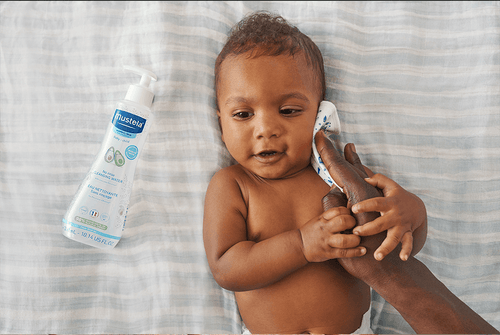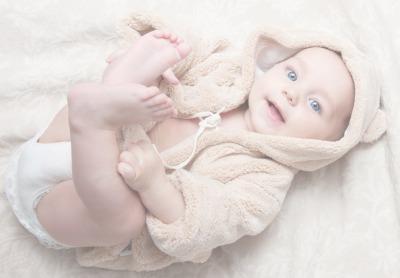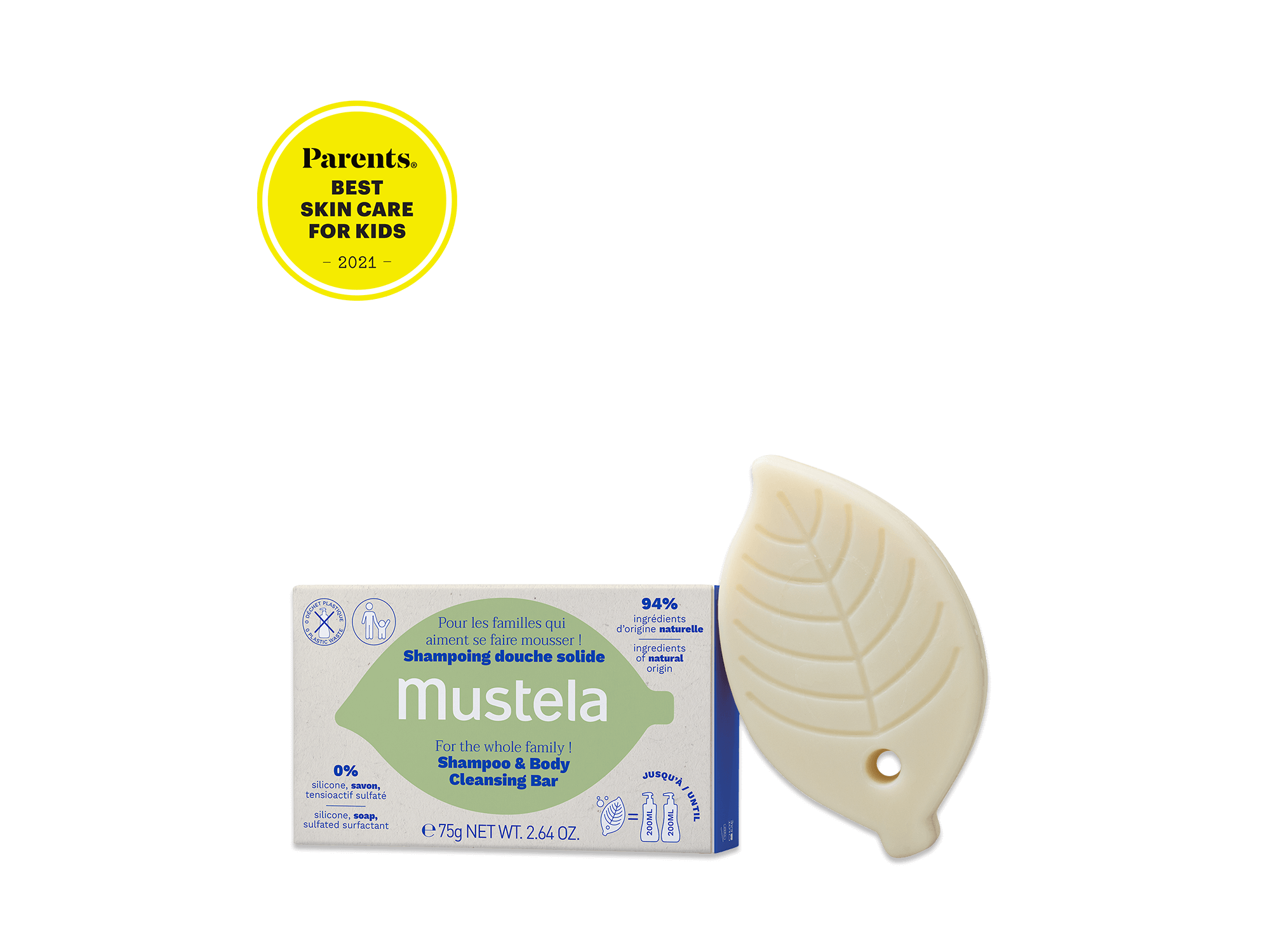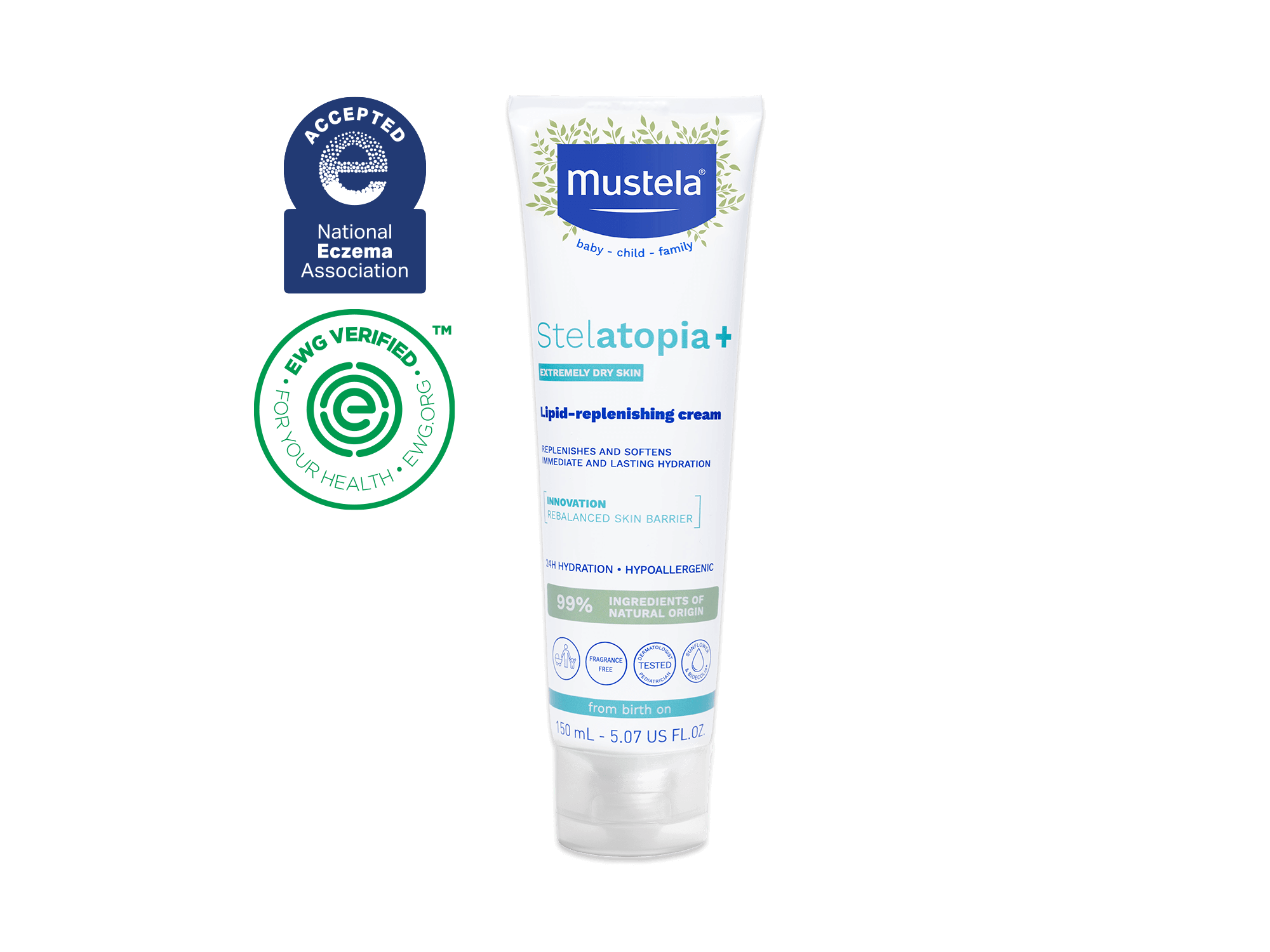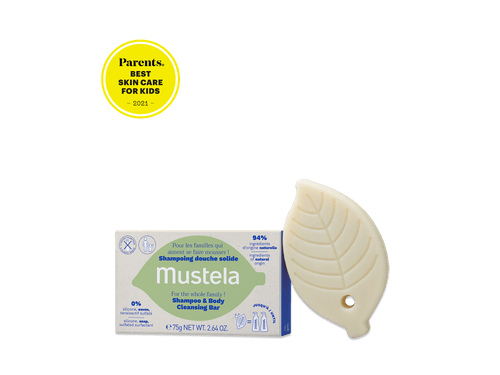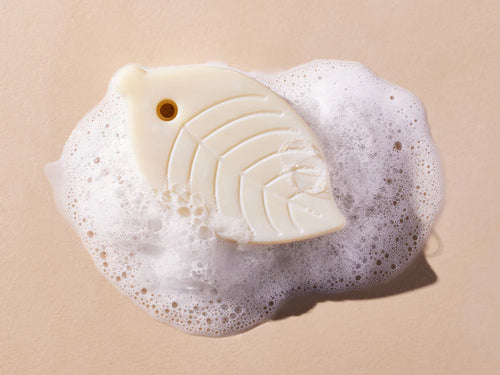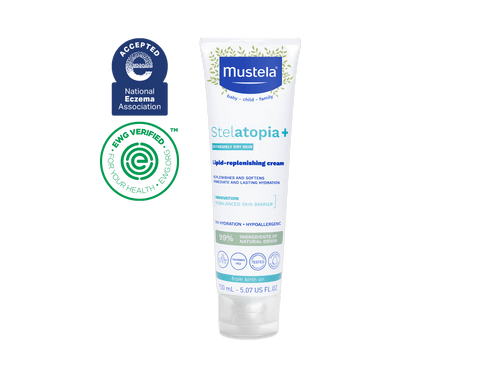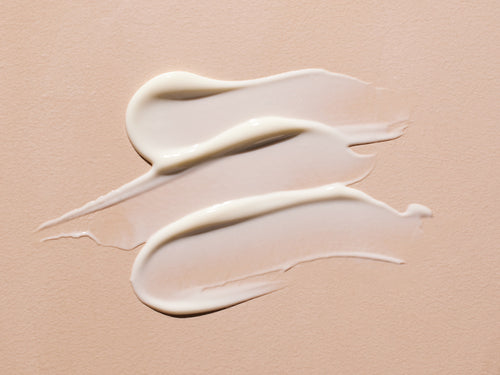The first three months of a child’s life really fly by. If you have a 3 month old baby, you’re probably wondering where the time went. It feels like your newborn came into the world just last week, and now they’re fully alert, laughing, and moving around!
At this point, you might have a few questions about your little one’s development. In this post, the baby experts at Mustela will help you do a quick check-in with your 3 month old baby. We’ll cover all the topics you might be wondering about, including your baby’s:
- Development
- Senses
- Motor skills
- Feeding schedule
- Sleeping habits
- Immunizations
We’ll also provide a few general childcare tips and tell you some possible warning signs to keep an eye out for. Let’s get started with our guide to caring for your 3 month old baby!
Caring For Your 3 Month Old Baby
Parents have much to learn in the first few months of their newborn’s life. It’s easy to feel overwhelmed by all the new experiences you’re sharing with your little one.
But by the time your baby hits the three-month mark, you’ve undoubtedly become a pro at changing dirty diapers and cleaning your baby’s bottom. And you’ve definitely developed the perfect hygiene routine and mastered the practice of carrying your baby.
However, newborns grow at a staggering speed, and sometimes it’s hard to know what to expect. This guide will answer all the questions you may have.
Your 3 Month Old Baby’s Development
It’s likely that your little one is fast outgrowing their clothes by this point! Your baby will be noticeably longer and heavier than last month.
At three months of age, female babies, on average, weigh 12.8 pounds and are 23.5 inches in length (height). Male three month olds tend to be a bit larger, with an average weight of 13.8 pounds and an average length (height) of 24.25 inches.
It’s important to note that these are just averages. If your baby is bigger or smaller than the figures above, it’s nothing to worry about! Some babies grow quickly in the first few months of life, while others are late bloomers. Every child follows their own unique developmental path.
Around the three-month mark, the fontanelle (soft spot on the back of a baby’s head) should have closed. The one on top of their head, however, will remain open for a few more months. Your baby’s head will likely feel a lot harder now than in previous months.
It may even seem as though their head has grown much faster than their body! This appearance is normal, and your little one’s body will catch up in growth soon enough.
Your 3 Month Old Baby’s Senses
At the beginning of your baby’s life, their senses were not very sharp. Your newborn’s vision was still developing, they didn’t have the ability to tell different sounds apart, and they didn’t have the muscle strength to move their tiny baby body very much.
Now, in just three short months, all of that has changed.
Sense Of Sight
Your 3 month old baby can now see clearly several feet in front of them and can see objects and faces up to 15 feet away. That means your little one’s world is expanding each and every day!
Your child can recognize familiar faces, like yours and your partner’s. They will still prefer to look at objects with bright colors, bold lines, basic shapes, and simple designs, but your baby’s vision is improving every day.
Your 3 month old can recognize familiar faces, like yourself and your partner’s. They will still prefer to look at objects with bright colors, bold lines, basic shapes, and simple designs, but your baby’s vision is improving.
Engage your baby's sense of sight by pointing out interesting things to look at during your adventures outside or in busier places, like a cafe or the mall. If you notice their gaze lingering on something, try to get closer to let them take it all in.

Sense Of Hearing
In addition to vision, your little one’s hearing is also developing rapidly. Your 3 month old baby is now able to recognize familiar voices.
The sound of your voice and your partner’s voice will often prompt a smile from your little one. This is because your baby knows it’s Mommy and Daddy talking and finds your voices soothing.
Explore what your little one responds to by trying out new sounds. Music — as well as books and toys that make noise — is a great way to engage your baby’s sense of hearing and discover which sounds seem interesting.
Sense Of Touch
Your 3 month old baby has a keen sense of touch that is continuing to develop every day. They will enjoy feeling your skin touch theirs. Your baby will also enjoy feeling different surfaces and textures.
As their hand-eye coordination grows, you’ll probably notice your 3 month old reaching for objects more. They’ve likely also found their hands and feet by now and can become very fascinated with touching them!
If you haven’t already, try giving your little one a baby massage. This calming technique is great to implement after bath time, right before your baby goes to sleep.
We recommend our Baby Oil for adding a little extra TLC into your 3 month old’s nighttime routine!
Sense Of Smell And Taste
Your little one’s sense of smell is getting stronger every day. As well as identifying you and your partner by scent, your 3 month old baby can now differentiate between a stranger and someone familiar. Your baby will also find comfort in the scent of their favorite toys and blankets.
By this age, your baby’s tongue will have grown, and they will likely be mouthing (putting things in their mouth) a lot. This is a way that babies learn about the world!
While they still have sensitive taste buds, they prefer sweeter tastes like that of breastmilk. Don’t worry, your baby won’t get tired of that taste! They don’t need variety at this age and are very content sticking to their current, if limited, diet.
Your 3 Month Old Baby’s Skill Development
Motor Skills
There are a number of motor skill milestones you can expect around your baby’s three-month birthday. You will notice that your little one has the ability to:
- Lift and control their head
- Reach for and swipe at objects in front of them
- Open and close their hands
- Grasp objects and move them around (especially to their mouth!)
- Lift their shoulders and chest off the ground when they’re on their tummy
- Kick their feet when lying down or when being held
It’s incredible to think how much babies grow and develop in just three months!
Language Skills
The three-month mark is an exciting time for speech development in your little one!
While they can’t respond with words just yet, your 3 month old baby can definitely make noises. Your infant will make cooing sounds and babble when you speak to them. They may also begin making vowel sounds, such as “ooh” and “aah.”
Squeals of delight are common at this age, and you’re probably learning what each sound from your little one means.
You can assist your little one’s development of language skills by smiling and laughing, saying their name, using gestures such as pointing while speaking, and incorporating games like peek-a-boo.
Your 3 month old baby is listening to you constantly, so be sure to use a variety of engaging changes in pitch and tone during everyday conversation. This can be immensely helpful in developing your little one’s language skills from an early age.
Your 3 Month Old Baby’s Feeding Schedule
Many parents wonder whether or not it’s OK to give their 3 month old baby solid food. Not yet!
The American Association of Pediatrics recommends breastfeeding or bottle feeding exclusively for the first six months of your child’s life. If you’re eager to introduce solid foods to your child’s diet, you must wait until at least the four-month mark and until your baby has doubled in weight since birth.
Another common question is whether a 3 month old baby needs water. The answer, again, is not yet. A well-fed baby receives all the liquid and nutrition they need from a mother’s breast milk or from baby formula.
At three months old, your baby should be eating six to eight times a day. If you’re formula-feeding your baby, they should consume roughly five ounces of formula at each feeding. If you’re breastfeeding, simply allow your baby to nurse until they seem content.
Breastfeeding may go quicker now than it did when your baby was first born since both you and your child have had lots of practice. Just make sure that your little one is gaining weight properly, and it’s safe to assume that they’re getting plenty to eat.

Your 3 Month Old Baby’s Sleeping Habits
After the first three months of your baby’s life, you’re probably feeling a little sleep-deprived. Well, we have good news for you! Around three months is when your baby will begin sleeping up to seven hours in a row at night, allowing you to get some much-needed rest.
On average, 3 month old babies sleep about 15 hours per day. It’s common for babies to sleep as much as 10 hours at night, normally in two large blocks of time.
Your little one might sleep for six hours, wake up wanting to be fed, and then go back to sleep for another four hours. The remaining five hours of sleep will occur in one- to two-hour naps throughout the day.
It’s important to start developing healthy sleep habits for your little one now. Put your baby down to sleep at the same time every evening. Between 7:00 p.m. and 8:00 p.m. is ideal.
Always put your baby to sleep on their back, never on their stomach. This greatly reduces the risk of Sudden Infant Death Syndrome (SIDS).
Your 3 Month Old Baby’s Immunizations
More good news about your 3 month old baby! They will not need any new immunization shots when they hit the three-month mark.
However, your baby should have already received a number of immunizations, including:
- Two rounds of Hepatitis B vaccine.
- Polio vaccine (IPV).
- Rotavirus vaccine (RV).
- Diphtheria, tetanus, and acellular pertussis vaccine (DTaP).
- Haemophilus influenzae type B vaccine (HIB).
- Pneumococcal conjugate vaccine (PCV).
If you’ve missed any of these immunizations, now is the best time to get caught up.
General Childcare Tips
Stimulation For Your Little One

At this point in your child’s life, their brain is developing extremely quickly. This means one of the most important things you can do it provide lots of stimulation.
Speak, read, and sing to your baby often. Smile at your little one, make eye contact, allow them to examine your face, and try to have a conversation. They may even attempt to mimic the sounds you make.
Let yourself be silly and free when you play with your baby! The games you create and play with your little one serve as excellent bonding activities, as well as teaching valuable language and conversation skills.
Be sure your baby has plenty of toys, rattles, shakers, and bright blocks to keep their senses stimulated. A rotating mobile to hang above their crib is also beneficial. Keep your baby’s nursery full of stimulating objects.
Use your little one’s reactions to playtime and lively conversations to guide you as to when it’s time to take a break. With such short attention spans at three months old, your baby will likely tire of games fairly quickly.
Keeping Baby Safe
As your 3 month old is learning to grasp and pick up objects, it’s important to keep a close eye on them and remove potential hazards from their reach.
Just as with the babyproofing you would have done previously, it’s crucial that you view the world from your little one’s perspective. Ensure your baby’s immediate surroundings are free from small objects, such as pieces of food that could cause your little one to choke.
While your baby isn’t mobile enough yet to find themselves in too many dangerous situations, it’s still crucial that you never leave them unattended, even for a short period.
Skin Care Recommendations
At three months of age, your baby still only needs to be bathed one to two times per week (outside of quick clean-ups, that is! For those instances, we love these Cleansing Wipes.)

However, you may find that as your baby gets more comfortable during bathtime, they begin to love splashing and playing in the water. If this is the case, you may want to incorporate extra bath times as a means of play.
Baby skin is incredibly delicate and sensitive. Mustela’s baby products have been specially formulated to soothe, moisturize, and hydrate your little one’s skin. We use only ingredients of natural origin per ISO 16128 standard to ensure your baby remains free from skin irritations.
For bath time, opt for a hydrating product, like our Multi-Sensory Bubble Bath. Paired with our Gentle Shampoo and Soothing Cleansing Gel, this combination makes for a relaxing bath time experience.
If your little one has particularly dry or sensitive skin, avoid harsh ingredients and instead reach for a natural moisturizing cream like our Stelatopia Emollient Cream.

When To Be Concerned
Finally, let’s discuss some warning signs that your baby has a developmental delay. Take your little one to the pediatrician if they:
- Have not yet smiled
- Do not respond to loud noises or your and your partner’s voices
- Cannot track objects with their eyes
- Cannot lift or hold up their own head
- Cannot grasp and hold small objects in their hands
Staying Well As A New Parent
It’s no secret that being a parent to a 3 month old baby is hard work. Any parent can attest to those first few months being a huge adjustment!
It’s more important now than ever before that you take care of yourself. Staying well as a new parent allows you to care for your little one in the best way possible, as well as ensuring you meet your own needs as an individual.
In addition to getting adequate nutrition, hydration, and sleep, the tips below will help you to be the best version of yourself — and the best parent you can be!
Get Fresh Air
Whether it’s medically cleared exercise or just a simple stroll around the block, it’s crucial that you find the time to get outdoors to avoid going stir crazy at home with your little one.
Leaving your house to get some fresh air for just 30 minutes can work wonders for your mood, patience, and overall mental stability.
Vitamin D is healthy for both yourself and your little one; just remember to use sun protection (like our SPF 50 Mineral Sunscreen Lotion!) to keep yourself and your three month old safe from the sun’s rays.
Maintain Social Interactions
As much as you may love spending time with your little one, we all need social interaction from time to time, and that means getting to hang out with other adults. After all, talking to a 3 month old baby all day hardly counts as a conversation!
If you’re yet to look into joining a parenting group, now is the time. These groups serve as a valuable means of support for new parents, as well as a great opportunity for your little one to be social with children their own age.
It’s also important to maintain friendships, whether that be with other parents or with old friends and work colleagues.
Remember: you’re an individual outside of being a parent, and it’s OK to take care of your needs as well as your baby’s.
Seek Professional Help
At three months postpartum, if you find yourself feeling particularly down, angry, emotionless, or just not yourself, you may be experiencing postpartum depression. This common mental health issue is completely normal, treatable, and nothing to be ashamed of.
Reach out to your doctor to learn more about how you can best help yourself and your baby by overcoming the difficulties associated with postpartum depression.
Final Thoughts On Caring For Your 3 Month Old Baby

Your 3 month old baby is growing by leaps and bounds every day! You can support their development by providing plenty of stimulation, opportunities for communication, and ensuring their safety through adequate supervision.
Remember to always use gentle, baby-safe products on your little one’s delicate skin to keep them happy and healthy. Moisturizing lotions, like our Hydra Bebe Body Lotion, are the perfect way to maintain your little one’s perfect skin.
For even more tips and tricks on caring for your baby, head to the Mustela Blog!

